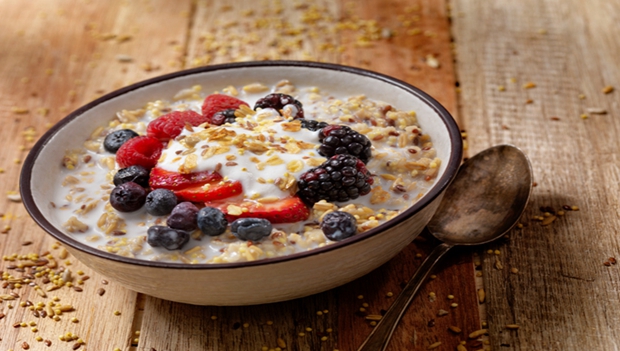
Like many student athletes who vie for gym space and playing time, swimmers often face early morning workouts due to pool scheduling and availability. It is not uncommon to see swimmers in the water by 5 a.m. One of the concerns with scheduling practices early in the morning is what to do with breakfast.
Athletes are often advised to eat two to three hours before exercise to allow for stomach emptying. Most athletes do not want to eat just before practice or a competition, as the food left in their stomach may cause nausea and gastrointestinal upset.
So rather than getting up at the crack of dawn to eat, many swimmers simply forgo food before practice. This habit of skipping food or a meal before exercise, especially after an overnight fast, can lower the body's store of energy and impair their ability to train and compete.
Try these suggestions:
- Two pieces of toast with juice
- Small bowl of cereal with low-fat milk
- Banana and one tablespoon peanut butter
- Bagel with small amount of cream cheese
- Applesauce and two graham crackers
- Gatorade Energy bar and Gatorade Thirst Quencher
- Raisins and pretzels
- Fig bars and low-fat milk
How can swimmers eat breakfast without having to wake up at 3 a.m.? Simply stated swimmers need to snack before an early-morning swim and then eat breakfast once the workout is over. While it's not easy, once the swimmer gets into the swing of it, the habit becomes routine.
While the athlete doesn't want to have a full stomach, having a light snack can refuel and hydrate him or her before the workout. Swimmers should pack the foods the night before and then they can grab it and eat it in the car if they are pressed for time in the morning.
Recovery Strategies
Once the workout is over, it is very important that swimmers eat a regular breakfast. Most competitive swimmers work out six days a week. To recover from the workout, both fluid and fuel must be available to the body. If the meal can be eaten within 30 minutes after the workout, then the body can start the recovery process faster and be ready by the next practice to provide a quality workout.
Carbohydrates are the most efficient source of energy for muscles. An athlete's diet should consist of approximately 60 percent of total calories from carbohydrates like breads, rice, cereal, pasta, bagels, muffins, fruits and vegetables. Athletes with low-carbohydrate diets cannot easily recover their pre-exercise muscle glycogen levels before their next workout.
Some swimmers are unable to eat after practice due to time constraints, lack of appetite or stomach discomfort. During these times a liquid meal replacement, such as a nutrition shake or a high-carbohydrate drink, can be used. Then, when the appetite returns, try to eat the suggestions listed below:
- One bagel with peanut butter and banana
- Bowl of oatmeal with raisins and nuts
- One cup of low-fat yogurt, banana and orange juice
- Waffle with syrup and low-fat milk
- Three pancakes with syrup and low-fat milk
- One breakfast egg sandwich with ham and orange juice


